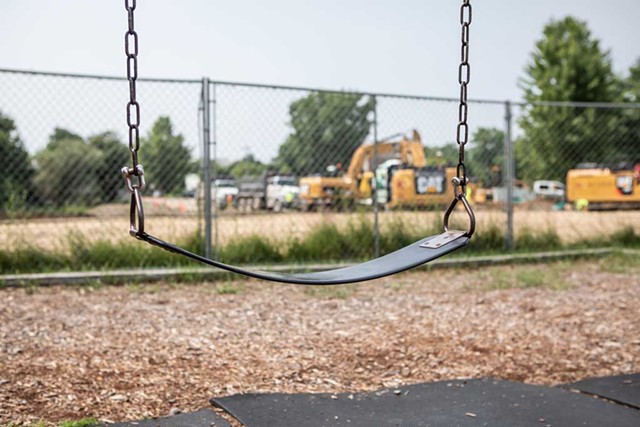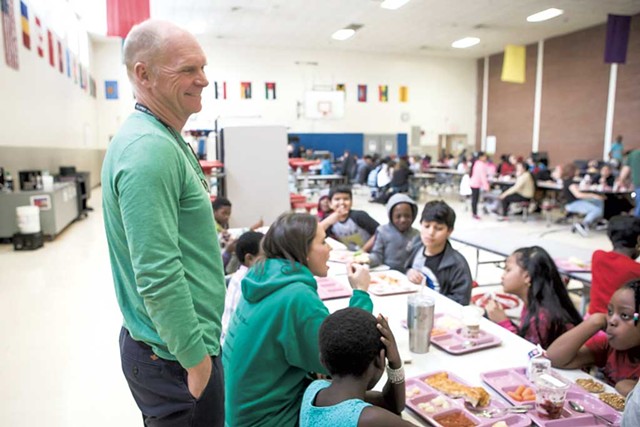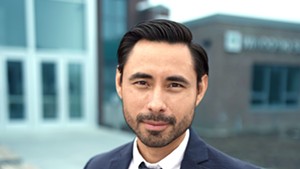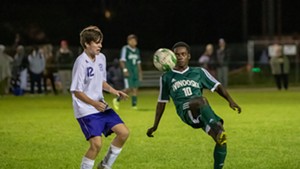
- Luke Awtry
- The campus for Winooski schools, which are under construction
Last July, a group of Winooski High School students and recent alumni came to the school board with a clear message. Calling themselves the Winooski Students for Anti-Racism, they shared painful experiences of unjust treatment from teachers, administrators and white peers, and of being called racist names by opposing sports teams.
The group presented eight demands aimed at creating an anti-racist school district that supports students of color, who make up more than 50 percent of the student body. The young people urged the board to take immediate action on the wide-ranging measures, including forming a truth and reconciliation commission to hear past accounts of racial bias in the school district; replacing the uniformed school resource officer with two trauma specialists; developing an action plan for hiring teachers of color; and working to create an ethnic studies program.
"Winooski School District must acknowledge and accept the fact that racism has existed in its halls for decades and, in many instances, it has caused long lasting trauma among many students of color," read a student-penned letter prefacing the demands.
At the time, school board members indicated that they grasped the urgency of the situation.
"You guys are asking us to do what has needed to be done," Tori Cleiland, now the school board president, said at the July 2020 meeting. "It is the time to do this now." The board voted in September to accept six of the eight student demands.
Yet more than a year after that initial meeting, there has been little action. On a website called Equity and Antiracism at Winooski, created by district math teacher Luke Dorfman, each student demand is listed, followed by a status update. For all those agreed to by the board, the status reads: "No actions have been taken to date."
Several prominent voices of color have left the school district. Last September, the board's only Black member, Margaret Bass, stepped down. And in June, the sole Black teacher in the middle and high school, Thierry Mugabo Uwilingiyimana — who had worked closely with the Winooski Students for Anti-Racism — also resigned. In a letter to administrators, Uwilingiyimana cited the district's "white supremacy culture" as a reason for leaving and called out "a leadership that would rather talk about diversity than be diversified."
"I know you all want to do your best for Winooski, but you aren't currently," Uwilingiyimana wrote. "Ultimately, the only way to bring about the changes we need is for [Black, Indigenous and people of color] to have more power which means you need to cede your power."
Related One of Winooski’s Only Black Teachers Resigns, Calls Out Culture of Racism

Earlier this month, the school district published an open letter from superintendent Sean McMannon addressing Uwilingiyimana's departure and the slow progress on reform. Titled "Winooski's humbling, difficult journey to becoming an antiracist school district," the letter acknowledged that the district, "in spite of its best intentions, was unable to provide the support needed for ... Uwilingiyimana, so he could feel grounded, welcomed, and successful as a new teacher."
McMannon outlined some of the district's recent actions, including the formation of a "radically inclusive" Antiracism Steering Committee that he said would guide work on reforms during the 2021-22 school year.
In an interview, McMannon and board president Cleiland spoke about the barriers they believe have caused the delay in acting on the students' concerns.
McMannon described a cascade of recent events that led to a sense of "constant coping": opening school during the pandemic, writing and adopting a budget, dealing with several COVID-19 outbreaks, and planning how to use federal money to support students' learning loss.
"When we act out of urgency, things don't go well," Cleiland said. "We really do know that when we slow down and get intentional, it's going to be more sustainable because we're really being thoughtful about who's involved."
Matthew Webb, vice president of the Winooski Education Association and an instructional coach in the district, also cited the physical and emotional exhaustion of teachers and staff this year, as well as the district's $58 million capital project — a major overhaul of the school building currently under way — as factors that slowed progress.
The capital improvements will help address "the 'savage inequalities' between inner city and suburban schools which are the products of systemic racism and classism at the root of our country's history," Webb wrote in an email.
But for some community members, none of those explanations is sufficient. Former board member Bass said the district could have advanced anti-racism initiatives with the same energy it applied to coping with the pandemic.
"It's never a priority," she said of anti-racism work. "Anything else takes priority over that. That, for me, is the most serious issue."
She pointed to Uwilingiyimana's resignation, and her own, as events that should raise serious questions for the district leadership.
"What is it in Winooski that causes ... some BIPOC folks to believe they are either unheard, underappreciated, ineffective or all of the above?" Bass asked. "The silence that surrounded my resignation from the board told me everything I needed to know about the importance of a Black voice on the Winooski School Board."
Rainbow Chen, a 2017 Winooski High School graduate and a leader of Winooski Students for Anti-Racism, said the school board's acceptance of students' demands generated "peak momentum" toward doing the necessary work. But she said the district's leadership did not trust the young people, whose ages ranged from 15 to mid-twenties, to take the reins.
"What was really clear to me is that we were seen as children," Chen said in an interview. "They did not see us as people who had the ability to make these demands happen and for us to lead them."
Ideally, the student group would have been given a budget and the autonomy to create a steering committee last fall, said Chen. Instead, the committee wasn't created until April, by which point a lot of energy had been lost, she said.
Uwilingiyimana said the pandemic exacerbated inequities faced by marginalized groups, which should have made anti-racism work an even more urgent priority. If McMannon had too much on his plate to oversee it, Uwilingiyimana said, he should have designated someone else to do so.
Dorfman, the math teacher, said that many other school districts in the state — all of which are less diverse than Winooski — have created or are in the process of creating an equity director position. Establishing a similar role in Winooski, and equipping that person with the resources and power to shape decisions, would help the district prioritize its anti-racism work, he said.

- File: Luke Awtry
- Winooski superintendent Sean McMannon in 2019
In his resignation letter, Uwilingiyimana said he proposed the creation of such a job for next school year, but McMannon turned down the idea. McMannon acknowledged Uwilingiyimana's request but said it came too late, after the budget had been adopted. He said he told Uwilingiyimana that he was willing to work with him on developing the job in the future.
Another point of tension, according to a number of people of color, was the board's decision to keep the school resource officer, who is a member of the Winooski Police Department. Students who advocated for the removal of the officer cited research that shows in-school officers disproportionately target students of color and don't actually make schools safer. But the board declined to eliminate the job until it could get input from more community members.
Later, at several forums on school safety, the board heard from dozens of residents, including a number of New American parents who expressed support for the in-school police officer. In April, the board voted to keep the position for the 2021-22 school year and create a committee to make recommendations about the role for 2022-23.
The decision the board made "was considering all voices," board president Cleiland said. "We didn't feel like the community was ready for this to be a 'yes' or 'no' answer."
But Chen, who is a recent graduate of Brown University and a Fulbright scholar, said the board's decision to retain the school resource officer was disheartening.
"I felt like my thread of connection with Winooski snapped at that moment," Chen said.
She views the school resource officer debate as one between democracy and justice. "I think we're so stuck on democracy and having equal representation, rather than understanding what is just, what is wrong, what needs healing," she said.
Chen, who served as a student representative on the State Board of Education in high school, said she always imagined returning to Winooski to teach high school one day. Now, she said, she doesn't even like driving by the school.
Former school board member Bass said her primary reason for resigning was the tension she felt around the police-in-schools issue. She voted in favor of keeping the officer, she said, because she didn't think the Winooski Students for Anti-Racism had garnered enough community support for eliminating the position.
While the vote was the right thing to do as an elected representative, she said, it violated her conscience as a Black woman.
"I never want to be put in a situation like that again," Bass said.
Despite the difficulties the district has encountered, Cleiland said the board remains steadfast in its determination to do the necessary anti-racism work.
"It is a full commitment, and I think that's why this journey is so humbling," Cleiland said. "I think, certainly, it can seem like it's the white people in charge getting in the way of it, but it's certainly not where my heart is ... It's a big journey, and it's worthwhile, even though it looks and feels sometimes super messy."
UP for Learning, a nonprofit contracted by the school district, is paying Evelyn Monje, a 2021 Winooski High School graduate and one of the original members of Winooski Students for Anti-Racism, to help facilitate the Anti-racism Steering Committee and colead monthly school board trainings about the culture of white supremacy.
What's happening in Winooski reminds Monje of a concept she's come across in a book she's reading: Caste: The Origins of Our Discontent.
The author, Isabel Wilkerson, likens the United States to a house with a foundation that's rotten because it's built on racism, Monje explained. Even if you didn't build the house, it's your responsibility as the person who inhabits it to make sure it's safe and livable.
"The foundation that our school district is built on is rotten" and so it must be deconstructed and reconstructed, Monje said: "I think we're on that path, and I think it's slow, and I think it's hard — and it's necessary."
Monje said she still believes that change is possible. Though many of the members involved in the Winooski Students for Anti-Racism last summer have moved on, there is a new group of young teens who are attending steering committee meetings regularly — "and they're rocking it," Monje said.














Comments
Comments are closed.
From 2014-2020, Seven Days allowed readers to comment on all stories posted on our website. While we've appreciated the suggestions and insights, right now Seven Days is prioritizing our core mission — producing high-quality, responsible local journalism — over moderating online debates between readers.
To criticize, correct or praise our reporting, please send us a letter to the editor or send us a tip. We’ll check it out and report the results.
Online comments may return when we have better tech tools for managing them. Thanks for reading.